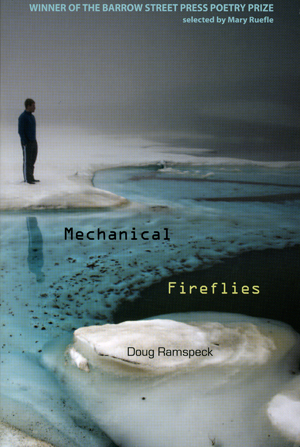Mechanical Fireflies
 Title: Mechanical Fireflies
Title: Mechanical FirefliesPublished by: Barrow Street Press
Release Date: 2011
Genre: Poetry
ISBN13: 978-0-9819876-4-4
Buy the Book: Barrow Street Press, Amazon, Barnes & Noble, IndieBound
Overview
Mechanical Fireflies explores the human tendency to imbue the physical world with human traits, and to interpret those human traits as inseparable from the natural order. In “I set up my desk in the woods and write,” the speaker imagines that there are “fragments of words / beneath tumbled apples / fermenting by the stream’s edge.” The surreal animism of the poems plays out across rural and urban landscapes, and delves into the present, the historical, and the mythological. Winner of the Barrow Street Press Poetry Prize, selected by Mary Ruefle.
Praise
"In today's world an apologia for this book would say that it is mature, that it is polished, and for those who wink at that—well let them wander off. But for those whose eyes remain open, whose hearts are not afraid to come closer, let them come and be pierced, let them come and read and turn the pages and be beholden to a poet who seems born to mesmerize, having learned from The Great Mesmerizer—the moon itself—that we are all one person, no matter who we are or when we lived."
—Mary Ruefle
“In Doug Ramspeck’s Mechanical Fireflies, the natural world intrudes on our daily lives in complex, often unnerving ways. Here, someone pulls the moon down to the shores of the earth with a system of pulleys and ropes, only to wonder if he has done the right thing. Elsewhere, a coyote with the face of a man devours a dead doe. Often, the narrators of these poems look over their moonlit landscapes, finding in them opportunities for profound, unpredictable meditations on sex, childhood, history, poetry, and violence. Inhabited by the ghost of Walt Whitman and imbued with the pleasures of nuanced observation, this is a richly imaginative, energetic poetry collection, one I will return to with pleasure.”
—Kevin Prufer
“Mechanical Fireflies is the perfect collision of James Wright’s anti-pastorals with Wallace Stevens’s meditations on the real. In the poem ‘Ars Poetica,’ we’re told that the speaker’s poetry students always ask him the same thing: is the story true? These poems make me believe that while the story may not be entirely true, it is always, in Ramspeck’s hands, chillingly and achingly real. One doesn’t have to live in Ohio—or Connecticut—to have a ‘mind of winter,’ but it helps.”
—Kathy Fagan
Sample Poem
Starving Horse
Every man’s memory is his private literature.
Aldous Huxley
It is morning and no worse for it.
The rote sorrow of sirens is in the streets.
In Cezanne’s Large Bathers, bodies become
wet clay, traceries, yet in the black bark
of the trees behind the dormitory there is
a savage simplification. I want this:
to be speech and spittle. A tongue lolling
in its juices. The hours are porous:
everything falls out of them, like water
in your palms. It is a war between knowing
and believing, every longing with a secret shape.
We are twenty and walk together across
the frozen Sig pond. It is not pleasure
we’ve been seeking but sexual literacy.
We climb stairs and arrange our bodies
in the furniture of the lecture room. Words
burning holes in the air. The juice of it staining
our hands—while confections of clouds
are drifting past outside the windows.
To imagine art as a starving horse
in a distant field. The convex bowl of its ribs.
And all else is incidental movement.